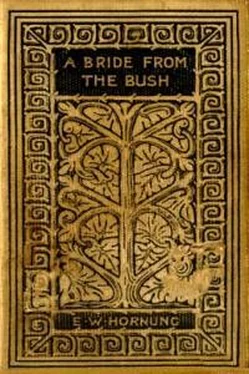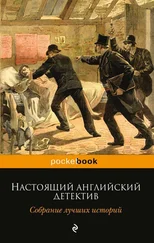Now, a moral acid, acting upon that blank tablet of the mind, would produce a precisely similar effect. Suppose Gladys became convinced that Alfred would be a happier man without her, that it would be even a relief to him to lose her: this would supply the moral acid.
The effect of this moral acid would coincide with that of the photographer's acid. In either case something that had been imperceptible hitherto would now start out in sharp outline. The blank film would yield the negative picture; the vague longings of Gladys would take the shape of two distinct alternatives, one of them inevitable.
Suppose this happened, one of these alternatives was so simple as to be already, in its embryo state, something of a temptation; while the other would remain a moral impossibility.
It must be remembered that the Bride confronted no such alternatives yet, but merely experienced vague, passionate longings. In this state of mind, however, but one drop of acid was needed to produce "development."
Chapter 14
"Hear My Prayer!"
Miss Travers did not, after all, succeed in cornering Gladys at the garden–party, but she did contrive to get herself asked to stay later, and without much difficulty (she would probably have found it far more difficult to go with the rest—hostesses were tenacious of Miss Travers); and after dinner, when the ladies went off to the drawing–room, her stubborn waiting was at last rewarded.
Some other people had stayed to dinner also, in the same informal way, and among them one or two of Granville's friends. These young men had come to the garden–party by no advice of Gran's—in fact, those who chanced to have mentioned to him Lady Bligh's invitation he had frankly told to stay away and not to be fools. But, having come, he insisted on their staying. "For," he said, "you deserve compensation, you fellows; and the Judge's wine, though I say it, hasn't a fault—unless it's spoiling a man for his club's."
And while the young men put the truth of this statement to a more earnest test than could be applied before the ladies left the table, Miss Travers, in the drawing–room, at last had Gladys to herself. And Miss Travers was sadly disappointed—as, perhaps, she deserved to be. Gladys had very little to say to her. As a matter of fact, it was no less irksome to the Bride to listen than to talk herself. But they happened to be sitting close to the piano, and it was not long before a very happy thought struck Gladys, which she instantly expressed in the abrupt question:—
"You sing, Miss Travers, don't you?"
"In a way."
"In a way! I've heard all about the way!" Gladys smiled; Miss Travers thought the smile sadly changed since yesterday. "Sing now."
"You really want me to?"
"Yes, really. And you must." Gladys opened the piano.
Miss Travers sang a little song that Gladys had never heard before, accompanying herself from memory. She sang very sweetly, very simply—in a word, uncommonly well. The voice, to begin with, was an exceptionally sound soprano, but the secret and charm of it all was, of course, in the way she used her voice. Gladys had asked for a song to escape from a chat, but she had forgotten her motive in asking—she had forgotten that she had asked for it—she had forgotten much that it had seemed impossible to forget, even thus, for one moment—before the song was half finished. Very possibly, with Gladys, who knew nothing of music, this was an appeal to the senses only; but it gave her some peaceful, painless moments when such were rare; and it left her, with everything coming back to her, it is true, but with a grateful heart. So grateful, indeed, was Gladys that she forgot to express her thanks until Miss Travers smilingly asked her how she liked that song; and then, instead of answering, she went over to where Lady Bligh was sitting, bent down, and asked a question, which was answered in a whisper.
Then Gladys came back to the piano. "Yes, I do like that song, very, very much; and I beg your pardon for not answering you, Miss Travers, but I was thinking of something else; and I want you, please, to sing Mendelssohn's 'Hear my Prayer!'" These words came quickly—they were newly learnt from Lady Bligh.
Miss Travers could not repress a smile. "Do you know what you are asking me for?"
"Yes; for what we heard in church last Sunday evening. That's the name, because I've just asked Lady Bligh. I would rather you sang that than anything else in the world!"
"But—" Miss Travers was puzzled by the Bride's expression; she would have given anything not to refuse, yet what could she do? "But—it isn't the sort of thing one can sit down and sing— really it isn't. It wants a chorus, and it is very long and elaborate."
"Yes?" Gladys seemed strangely disappointed. "But there was one part—the part I liked—where the chorus didn't come in, I am sure. It was sung by a boy. You could do it so much better! It was about the wings of a dove, and the wilderness. You know, I come from the wilderness myself"—the Bride smiled faintly—"and I thought I'd never heard anything half so lovely before; though of course I've heard very little."
"No matter how little you have heard, you will never hear anything much more beautiful than that," said Miss Travers, with sympathetic enthusiasm.
"Since I cannot hear it now, however, there is an end of it."
Gladys sighed, but her eyes pleaded still; it was impossible to look in them long and still resist. Miss Travers looked but for a moment, then, turning round to the keys, she softly touched a chord. "I will try the little bit you liked," she whispered, kindly, "whatever I make of it!"
What she did make of it is unimportant, except in its effect upon Gladys. This effect was very different from that produced a few minutes before by the song; this, at least, was no mere titillation of the senses by agreeable sounds. And it differed quite as much from the effect produced by the same thing in church on Sunday, when Gladys, after being surprised into listening, had listened only to the words. Then, indeed, the music had seemed sweet and sad, but to–night each note palpitated with a shivering, tremulous yearning, dropping into her soul a relief as deep as that of sorrow unbosomed, a comfort as soothing as the comfort of tears. And there was now an added infinity of meaning in the words; though it was the words that had thrilled her then—then, before she had brought all the present misery to pass.
O for the wings, for the wings of a dove!
Far away, far away would I rove:
In the wilderness build me a nest,
And remain there for ever at rest.
It is only a few bars, the solo here; and at the point where the chorus catches up the refrain Miss Travers softly ceased. She turned round slowly on the stool, then rose up quickly in surprise. Her ardent listener was gone. And as Miss Travers stood by the piano, peering with raised eyebrows into every corner of the room, and out into the night through the open French window, the men entered the room in a body—she was surrounded.
But Gladys had stepped softly through the window on to the lawn, re–entered the house by another way, and stolen swiftly up to her room. The last strains came to her through the open window of the drawing–room, and in at her own window, at which Gladys now knelt: and this short passage through the outer air brought them upward on the breath of the night, rarefied and softened as though from the lips of far–off angels: and so they reached her trembling ears.
The scent of roses was in the air. The moon was rising, and its rays spanned the river with a broad bridge of silver, against which some of the foliage at the garden–end stood out in fine filigree. It was a heavenly night; it was a sweet and tranquil place; but yet—
Читать дальше












